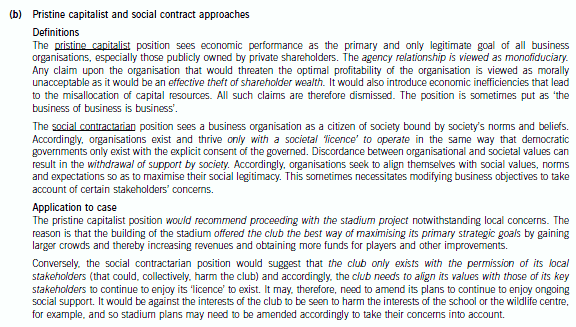准备ACCA考试哪版教材比较好?
发布时间:2022-05-20
准备ACCA考试的小伙伴都知道,ACCA官方认可的教材有三个版本,分别是BPP、Kaplan及Becker。那么第一次备考ACCA考试的考生应该如何选择适合自己的教材呢?接下来就和51题库考试学习网一起去了解下吧!
如果是基础比较薄弱的,或者英语水平较差的学员优先考虑BPP和FTC,如果是相对拥有一些扎实的财务基础,或者考过注会等的学员可以选择FTC。不过,中国国内仅买下了BPP版权,考生可以在国内商店进行购买,而其他两者则需要在国外购买。
以下是每个版本教材的特点:
1、BPP以详细见称,BPP教材是全球ACCA使用最多的版本,通俗易懂,比较适合新老学员自学,ACCA学员以看BPP课本及精简版讲义为主。同时但国内基本上所有的高校ACCA专业也是使用的BPP版教材,因为审计署买下了BPP教材在中国的版权,并且比之FTC版教材价格也有优势,每个点都讲解得很细。
ACCA教材BPP版本主要适合于英语水平一般的,理解能力稍微弱的或者是初学者等。但是ACCA教材BPP版本很多的,有时候讲得也很啰嗦。
2、FTC版是ACCA官方版本教材,在全球使用也比较多。这套教材的优点是简洁,基本上每门课教材都比BPP版薄,但是FTC对LW阶段的ACCA备考并不是那么适用,其难度较之BPP版有所加大,所用单词也要复杂一些。而且最新版有些地方讲解不是很细致,单凭它参加考试有一定难度。
目前这两种都较适合中国ACCA考生,关键在于其编撰风格对大家各自的适应程度如何。不管是FTC还是BPP的ACCA教材都只是负责知识点的讲解的,最终出题目的还是还是官方的。不管选择何种教材,ACCA学员在备考时,都一定要结合大纲,将ACCA教材多看几遍,再多做练习题,这样才不会在考试中失利,顺利的通过ACCA考试。总的来说,同学们可以根据自身需要,选择适合自己的教材最重要。
以上就是51题库考试学习网给大家带来的关于选择ACCA考试教材的相关内容,希望能够帮到大家!请大家持续关注51题库考试学习网,51题库考试学习网将会为大家带来最新、最热的考试资讯!
下面小编为大家准备了 ACCA考试 的相关考题,供大家学习参考。
(c) Assess how the fundamental ethical principles of IFAC’s Code of Ethics for Professional Accountants should
be applied to the provision of a forensic investigation service. (6 marks)
(c) Application of ethical principles to a fraud investigation
IFAC’s Code of Ethics for Professional Accountants applies to all ACCA members involved in professional assignments,
including forensic investigations. There are specific considerations in the application of each of the principles in providing
such a service.
Integrity
The forensic investigator is likely to deal frequently with individuals who lack integrity, are dishonest, and attempt to conceal
the true facts from the investigator. It is imperative that the investigator recognises this, and acts with impeccable integrity
throughout the whole investigation.
Objectivity
As in an audit engagement, the investigator’s objectivity must be beyond question. The report that is the outcome of the
forensic investigation must be perceived as independent, as it forms part of the legal evidence presented at court. The
investigator must adhere to the concept that the overriding objective of court proceedings is to deal with cases fairly and justly.
Any real or perceived threats to objectivity could undermine the credibility of the evidence provided by the investigator.
This issue poses a particular problem where an audit client requests its auditors to conduct a forensic investigation. In this
situation, the audit firm would be exposed to threats to objectivity in terms of advocacy, management involvement and selfreview.
The advocacy threat arises because the audit firm may feel pressured into promoting the interests and point of view
of their client, which would breach the overriding issue of objectivity in court proceedings. Secondly, the investigators could
be perceived to be involved in management decisions regarding the implications of the fraud, especially where the investigator
acts as an expert witness. It is however the self-review threat that would be the most significant threat to objectivity. The selfreview
threat arises because the investigation is likely to involve the estimation of an amount (i.e. the loss), which could be
material to the financial statements.
For the reasons outlined above, The Code states that the firm should evaluate threats and put appropriate safeguards in place,
and if safeguards cannot reduce the threats to an acceptable level, then the firm cannot provide both the audit service and
the forensic investigation.
Professional competence and due care
Forensic investigations will involve very specialist skills, which accountants are unlikely to possess without extensive training.
Such skills would include:
– Detailed knowledge of the relevant legal framework surrounding fraud,
– An understanding of how to gather specialist evidence,
– Skills in the safe custody of evidence, including maintaining a clear ‘chain’ of evidence, and
– Strong personal skills in, for example, interview techniques, presentation of material at court, and tactful dealing with
difficult and stressful situations.
It is therefore essential that forensic work is only ever undertaken by highly skilled individuals, under the direction and
supervision of an experienced fraud investigator. Any doubt over the competence of the investigation team could severely
undermine the credibility of the evidence presented at court.
Confidentiality
Normally accountants should not disclose information without the explicit consent of their client. However, during legal
proceedings arising from a fraud investigation, the court will require the investigator to reveal information discovered during
the investigation. There is an overriding requirement for the investigator to disclose all of the information deemed necessary
by the court.
Outside of the court, the investigator must ensure faultless confidentiality, especially because much of the information they
have access to will be highly sensitive.
Professional behaviour
Fraud investigations can become a matter of public interest, and much media attention is often focused on the work of the
forensic investigator. A highly professional attitude must be displayed at all times, in order to avoid damage to the reputation
of the firm, and of the profession. Any lapse in professional behaviour could also undermine the integrity of the forensic
evidence, and of the credibility of the investigator, especially when acting in the capacity of expert witness.
During legal proceedings, the forensic investigator may be involved in discussions with both sides in the court case, and here
it is essential that a courteous and considerate attitude is presented to all parties.
(b) Compare and contrast Gray, Owen and Adams’s ‘pristine capitalist’ position with the ‘social contractarian’
position. Explain how these positions would affect responses to stakeholder concerns in the new stadium
project. (8 marks)

(d) Corporate annual reports contain both mandatory and voluntary disclosures.
Required:
(i) Distinguish, using examples, between mandatory and voluntary disclosures in the annual reports of
public listed companies. (6 marks)
(d) (i) Mandatory and voluntary disclosures
Mandatory disclosures
These are components of the annual report mandated by law, regulation or accounting standard.
Examples include (in most jurisdictions) statement of comprehensive income (income or profit and loss statement),
statement of financial position (balance sheet), cash flow statement, statement of changes in equity, operating segmental
information, auditors’ report, corporate governance disclosure such as remuneration report and some items in the
directors’ report (e.g. summary of operating position). In the UK, the business review is compulsory.
Voluntary disclosures
These are components of the annual report not mandated in law or regulation but disclosed nevertheless. They are
typically mainly narrative rather than numerical in nature.
Examples include (in most jurisdictions) risk information, operating review, social and environmental information, and
the chief executive’s review.
声明:本文内容由互联网用户自发贡献自行上传,本网站不拥有所有权,未作人工编辑处理,也不承担相关法律责任。如果您发现有涉嫌版权的内容,欢迎发送邮件至:contact@51tk.com 进行举报,并提供相关证据,工作人员会在5个工作日内联系你,一经查实,本站将立刻删除涉嫌侵权内容。
- 2020-05-01
- 2020-04-19
- 2020-02-22
- 2020-01-09
- 2020-03-04
- 2020-03-04
- 2020-01-08
- 2020-03-29
- 2020-01-10
- 2020-03-19
- 2020-04-14
- 2020-03-04
- 2020-03-12
- 2020-04-28
- 2020-01-10
- 2020-04-23
- 2022-05-20
- 2020-10-08
- 2020-01-30
- 2020-02-27
- 2019-07-21
- 2020-03-14
- 2020-01-10
- 2021-05-06
- 2020-04-22
- 2020-02-20
- 2020-04-17
- 2020-01-10
- 2020-03-08
- 2020-03-19